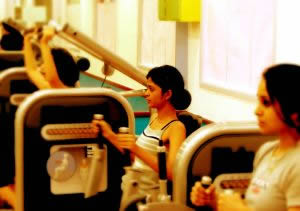

Written Tips by Pierre Chartier
Majic 100 may have John Tesh but we have four knowledgeable colleagues, right here at Algonquin, who are delighted to share their expertise with us:
Artificial Sweeteners: Friend or Foe?
 Researchers at Purdue University concluded in a recent study that rats consuming artificial sweetened yogurt ate more food and gained more weight during a two-week period than rats consuming sugar-sweetened yogurt.
Researchers at Purdue University concluded in a recent study that rats consuming artificial sweetened yogurt ate more food and gained more weight during a two-week period than rats consuming sugar-sweetened yogurt.
“It was postulated that artificial sweeteners actually hinder weight-loss efforts because they signal sweetness without the accompanying calories. In other words, one’s ability to balance caloric intake with output is thrown off because the brain’s ability to associate eating something sweet with calories is weakened.” (1)
Others are less convinced. Some researchers believe that other factors, such as portion size and mindless eating, have a greater influence on how much food one consumes.
More “unsweetened” food for thought …
1. Behavioral Neuroscience, 2008, 122, 1, 161-173
![]()
How Important is Exercise in the Prevention of Osteoporosis?
 Osteoporosis is the most common disease of the skeleton. It is characterized by low bone mass and deterioration of the microstructure of the bone, making it weak and prone to fracture. More than half of all women and one-fifth of all men over the age of 50 will suffer an osteoporotic fracture. Many won’t even know they have osteoporosis, as there are no apparent symptoms. (United States Public Health Service, Office of the Surgeon General, 2004)
Osteoporosis is the most common disease of the skeleton. It is characterized by low bone mass and deterioration of the microstructure of the bone, making it weak and prone to fracture. More than half of all women and one-fifth of all men over the age of 50 will suffer an osteoporotic fracture. Many won’t even know they have osteoporosis, as there are no apparent symptoms. (United States Public Health Service, Office of the Surgeon General, 2004)
Properly planned weight bearing exercises provide a direct stimulus to bone that improves its strength and structure.
For premenopausal women and middle-aged men emphasize strength and power activities. High intensity strength-training exercises (8-RM intensities) should also be included in a well-rounded exercise program. Research suggests that gains in bone density achieved later in life are reversible if the exercises are stopped. So, keep active!
Adopted from ACE Certified News. Volume 14, 2008
![]()
 Pierre Chartier is a professor in both the Fitness and Health Promotion and Recreation and Leisure Services programs. He has a Master’s Degree in Exercise Physiology, is a Certified Exercise Physiologist and an international presenter on Group Fitness leadership.
Pierre Chartier is a professor in both the Fitness and Health Promotion and Recreation and Leisure Services programs. He has a Master’s Degree in Exercise Physiology, is a Certified Exercise Physiologist and an international presenter on Group Fitness leadership.